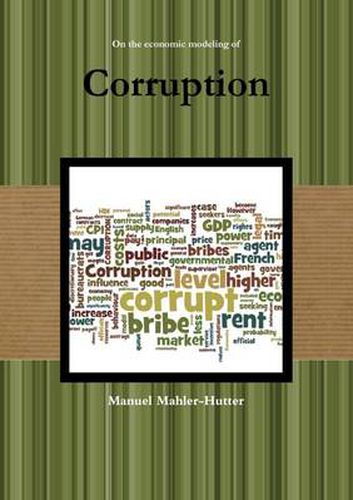Readings Newsletter
Become a Readings Member to make your shopping experience even easier.
Sign in or sign up for free!
You’re not far away from qualifying for FREE standard shipping within Australia
You’ve qualified for FREE standard shipping within Australia
The cart is loading…






This title is printed to order. This book may have been self-published. If so, we cannot guarantee the quality of the content. In the main most books will have gone through the editing process however some may not. We therefore suggest that you be aware of this before ordering this book. If in doubt check either the author or publisher’s details as we are unable to accept any returns unless they are faulty. Please contact us if you have any questions.
This work discusses the economic literature on Corruption. I draw the distinction between market- and parochial corruption. The institutions and the corrupt contract are the base of the following analysis. Corruption happens within a Principal-Agent relationship. Corruption may flourish if economic rents exist, the costs of corruption are low or if the agents have large discretionary power. I discuss whether corruption always has to have negative influence on economic efficency. The empirical part analysis the influence of certain determinantson the CPI. The main findings are: * Corruption can be reduced by increasing the availability of means of communication to a large part of the citizens. * Higher political interest may lead to less corruption due to increased sensitivity towards authority's actions. * Direct regulations of the freedom of trade or entry to business increase the level of corruption; or the level of corruption decreases the ease of trading and doing business.
$9.00 standard shipping within Australia
FREE standard shipping within Australia for orders over $100.00
Express & International shipping calculated at checkout
This title is printed to order. This book may have been self-published. If so, we cannot guarantee the quality of the content. In the main most books will have gone through the editing process however some may not. We therefore suggest that you be aware of this before ordering this book. If in doubt check either the author or publisher’s details as we are unable to accept any returns unless they are faulty. Please contact us if you have any questions.
This work discusses the economic literature on Corruption. I draw the distinction between market- and parochial corruption. The institutions and the corrupt contract are the base of the following analysis. Corruption happens within a Principal-Agent relationship. Corruption may flourish if economic rents exist, the costs of corruption are low or if the agents have large discretionary power. I discuss whether corruption always has to have negative influence on economic efficency. The empirical part analysis the influence of certain determinantson the CPI. The main findings are: * Corruption can be reduced by increasing the availability of means of communication to a large part of the citizens. * Higher political interest may lead to less corruption due to increased sensitivity towards authority's actions. * Direct regulations of the freedom of trade or entry to business increase the level of corruption; or the level of corruption decreases the ease of trading and doing business.